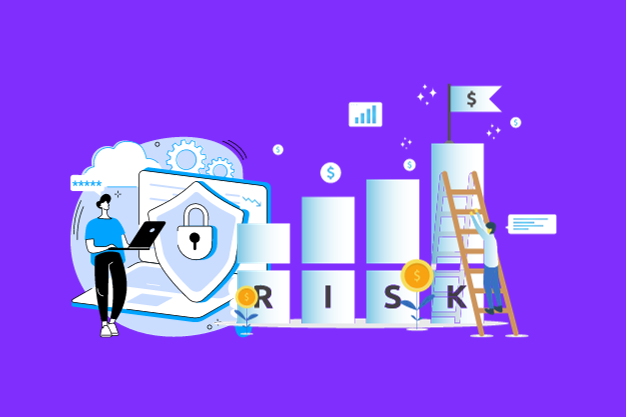In recent times, cloud adoption has become one of the key strategies for growth among all the modern organizations. Although cloud computing has been around for quite a long time, but with the onset of Covid-19 pandemic, enterprises have accelerated their cloud adoption like never before. Due to standardization of remote work, organizations are obliged to move to cloud to provide their employees with remotely available infrastructure and services. Today, approximately 94% of the organizations are using cloud services in some form or another, and around 76% of those organizations are using some form of multi-cloud deployments. Such cloud environments are used for hosting business-critical applications, storing users and operations data, and for sharing the computing resources.
This rapid adoption of cloud has given rise to unique cyberthreats and risks for the digital ecosystem of the organizations. Various security threats like identity and data theft, ransomware, prolonged downtime, mismanagement of resources, etc. have increased the safety concerns of the organizations. On top of that, the conventional security measures do not provide effective protection for the remotely located infrastructure. Hence, to ensure a safe and smooth operation of the cloud infrastructure, cloud security is of utmost importance.
What is cloud security?
Cloud security is a collection of principles, procedures, and technologies that are geared towards providing and maintaining security for your cloud apps, data, and infrastructure. It incorporates identity management, network audits, compliance with security frameworks, and malware-detection utilities that can minimize the threats and risk related to the cloud environment.
Many of the leading cloud providers like Microsoft Azure, Amazon Web Services, and Google Cloud Platform offer in-built cyber security features and services. Although these services are quite robust, they are generic and are not compatible within different platforms. In order to get enterprise-grade protection, enterprises may have to consult with third-party security agencies. They can help them set up their own customized security architecture based on a suitable strategy consisting of data safety, disaster recovery, compliance rules, and identity management.
Why is cloud security important?
Following are some of the reasons why cloud security is important –
1. Prevention of cyber-attacks and threats
Cyber-attacks have become more advanced in today’s ever-evolving digital landscape. The attacks on cloud computing are slower to detect because of the organization's lack of visibility over data movement and application hosting. By taking active steps to improve their cloud security, enterprises can prevent such attacks and minimize their ill-effects drastically even when they happen.
2. Improvement in data security
Data is the most valuable asset of any company today. Hence, data loss or data corruption is a major threat to a company’s health as it can halt its operations in an instant. Data security in the cloud is even more crucial, especially if you are using a public cloud storage platform. While the cloud provider does provide essential data security services, for achieving maximum security, organizations can integrate third-party security solutions to protect their data in the most effective manner.
3. Improved utilization of data recovery
With a good cloud security strategy, you can easily and regularly back up your critical data and recover it when any disaster or an attack happens. Similarly, off-premises workers can work on the data remotely without the need to physically save and protect it on their local machines. This also minimizes some of the security threats when anyone loses their device or gets their data stolen as administrators can promptly deactivate the device or account and prevent further data loss.
4. Compliance with rules and regulations
Compliance with different data protection standards and regulations is necessary for many organizations. Most cloud providers have made their platforms compliant with well-known protection standards such as PCI 3.2, GDPR, and HIPAA. But companies need to make sure that their workload and data processes are also compliant. Being compliant with these regulations ensures the company’s integrity and security over the cloud.
5. Cost savings and loss minimization
Cloud vendors provide native security utilities which are fast, scalable, and cost-effective. This can ease the efforts of your internal IT security team and make them productive. If you have deployed pre-emptive controls to avoid security issues from happening beforehand then you can minimize your losses and you may not be required to spend additional money on rebuilding and re-configuring your services and platform.
Challenges in implementing cloud security
Public or multi-cloud requires a fundamentally different security approach. It should also include provisions for automated CI/CD methods, distributed serverless environments, and other service modes like FaaS and DaaS. This challenge of complexity and other challenges related to setup, operations, and compliance are being faced by the cloud security of today. Some of these challenges are discussed below –
1. Complex multi-cloud environment
Many organizations use a multi-cloud environment in which multiple vendors provide different sets of applications on different platforms. This poses challenges in implementing a single data protection policy. Many apps are incompatible and it’s hard to achieve comprehensive visibility and control over assets. Implementing security in such setups also requires a wide variety of cloud skills which most enterprises do not have time to develop.
2. Improper access management
Managing access and roles in the on-premises environment is relatively easy as compared to the off-premises environment. Restricting access points and implementing the same levels of restrictions can be challenging in cloud environments. Hence, security restrictions have to be maintained both at the user account level and at the device level. Strategies like multi-factor authentication and Zero Trust can help but they may or may not be compliant with the operational policies of the organization.
3. Misconfigurations and human errors
Misconfigured assets can lead to data breaches it is a major issue for cloud environments. Misconfigurations include instances such as keeping default passwords, or not following correct privacy settings. These are human-lead errors and may not be easily detected and handled by your cloud security model.
4. Compliance and regulation hurdles
Creating and implementing compliance policies in a cloud ecosystem is a complex task. It requires specialist knowledge and keeping up with the changing regulatory requirements. Even after it is done, running compliance audits, monitoring, and managing risk assessments can be a tough job. Thus, cloud compliance poses a big challenge to cloud security.
In conclusion
Cloud computing and cloud infrastructure can significantly improve an organization’s performance. It offers scalability, cost savings, reduced downtime, and freedom of access for its users. But when it comes to implementing security measures, there are significant differences between local and cloud-based infrastructure.
Hence, successful cloud adoption is one in which adequate security measures are deployed to fight against modern cyberattacks. Irrespective of whether your company uses a public, private, or hybrid cloud environment, knowing the importance of cloud security and its challenges is necessary to design a robust cloud security strategy for your organization.



